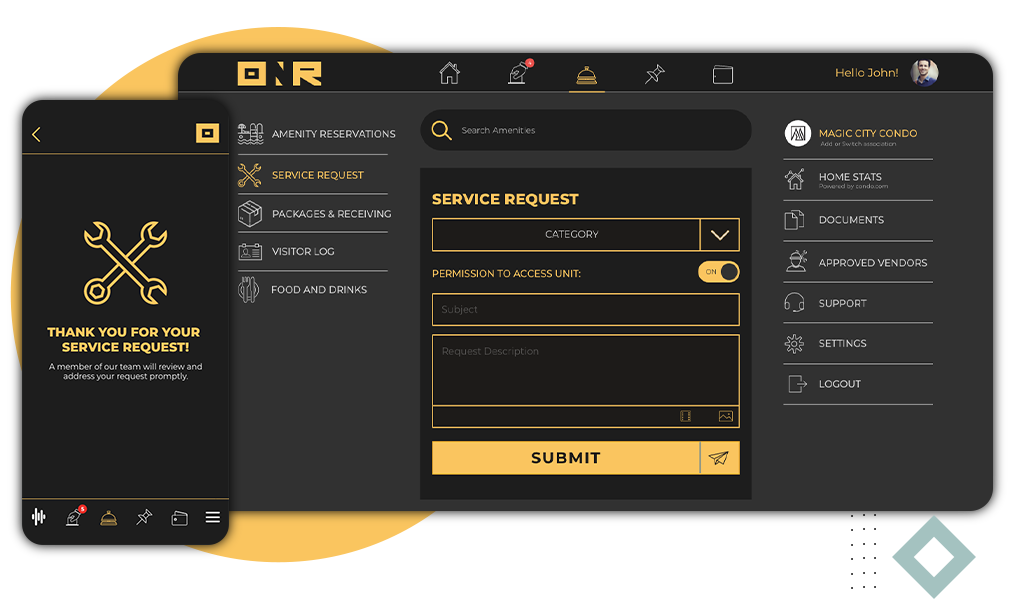Florida is a state with a strong tourism industry, which contributes to the high demand for rental properties, creating a highly competitive market.
Managing communities in Florida comes with an increasing level of complexity as property managers need to stay up-to-date with the state’s laws and regulations to avoid legal issues that can arise from non-compliance. Tenant turnover rates in Florida are high, which means that management offices are constantly dealing with new occupants and the associated administrative tasks that come with renting out a property.
This can be a daunting task, especially when combined with the never-ending stream of leaseholder complaints and maintenance asks. The good news is that property managers in Florida can turn to ONR for help. ONR is a software platform designed to help streamline operations, reduce workload, and improve the bottom line. With ONR, anyone can easily access tenant information, track rent payments, and receive support petitions from a centralized platform, eliminating the need for paper records and manual data entry.
One of the most significant benefits of using ONR is the automated maintenance request system that allows renters to submit requests online, freeing up everyone’s time to focus on more pressing issues. The system prioritizes petitions based on their urgency, ensuring prompt attention to issues and minimizing the chance of disputes arising from unaddressed problems.
ONR also provides reporting tools that allow the monitoring of their properties’ financial health with ease. They can view financial statements, track lease income and expenses, and generate reports that show their performance. This information is critical for making informed decisions about their properties and identifying areas for improvement.
The Florida rental market is strong, with the median rent for a two-bedroom apartment being $1,479 per month. This high price makes it crucial for property managers to control their properties efficiently and effectively to maximize their profits. ONR‘s customizable platform provides the flexibility and control they need to manage their properties successfully. With 24/7 support from a team of experts, management can rest assured that they have the resources they need to handle any issues that may arise.
Besides the benefits mentioned above, ONR can also help comply with state laws and statutes. The software platform ensures that they are up-to-date with the latest regulations, helping them avoid legal issues that can arise from non-compliance. This is critical as Florida has several codes and directives that property managers need to adhere to, such as the Florida Landlord and Tenant Act and the Florida Fair Housing Act.
The Florida Landlord and Tenant Act outlines the rights and responsibilities of both landlords and tenants in the state. For instance, the act requires landlords to provide inhabitants with safe and habitable living conditions and maintain the property in good condition. Failure to comply with this law can result in legal action against the landlord. ONR can help comply with this law by ensuring that they have a system in place to receive and address maintenance calls promptly.
Comparably, the Florida Fair Housing Act prohibits discrimination in housing on the basis of race, color, national origin, religion, sex, familial status, and disability. Property managers must ensure that their rental properties comply with this law. With ONR, the team can guarantee a fair and equal process by providing all occupants with the same access to the service request system and ensuring that all tenants receive timely responses to their requests.
ONR‘s software platform streamlines property management tasks, automates upkeep applications, and provides real-time reporting, saving valuable time and reducing stress levels. By using ONR, property managers can comply with state laws and regulations, boost their margins, and provide better service.
Five Facts to Better Understand the Florida Market:
- Florida is home to the largest number of vacation rental properties in the United States, with over 40,000 active listings.
- The average property management fee in Florida is around 8-10% of the monthly rent, although fees can vary depending on the size and location of the property.
- The Florida housing market has been growing steadily, with a 6.1% increase in median home prices since 2020, according to the Florida Realtors Association.
- The Florida Landlord and Tenant Act requires landlords to return a security deposit within 15 days of vacating the property or provide an itemized list of deductions from the deposit.
- The Florida Housing Finance Corporation provides a variety of programs and resources to help property managers and landlords provide affordable housing options to low and moderate-income renters.



